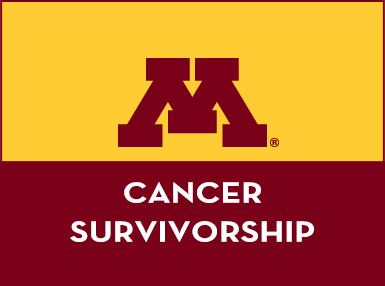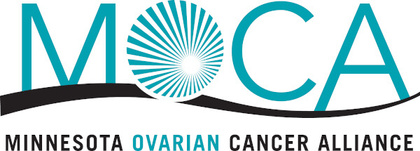Quality of Life of Cancer Survivors

IX Study
One of our core missions is to research survivorship issues during and after treatment for cancer and test interventions to improve quality of life and outcomes.
Current Research
The role of cytomegalovirus (CMV) and inflammation on patient symptoms and outcomes in ovarian cancer
In the United States, over 20,000 women are diagnosed with ovarian cancer annually. Surgery and chemotherapy often result in prolonged side effects. Cytomegalovirus (CMV), a widely prevalent virus in the general US population, has been shown to be associated with increased inflammation and mortality.
We are partnering with the Department of Defense - Ovarian Cancer Academy and Minnesota Ovarian Cancer Alliance (MOCA) to determine the relationship between CMV and ovarian cancer patient-reported symptoms after receiving chemotherapy, including fatigue and changes in cognitive functioning, often termed "chemo brain".
Status: We have completed recruitment and are finishing collecting data. Analyses are currently ongoing.



Dr. Vogel has grant funding from the Department of Defense - Ovarian Cancer Research Program and Minnesota Ovarian Cancer Alliance to support this research.
Related Publications
- Hunter-Schlichting DN, Vogel RI, Geller MA, Nelson HH. Quantification of low-level Cytomegalovirus and Epstein-Barr virus DNAemia by digital PCR. J Virol Methods. 2024 Jan 4:114876. doi: 10.1016/j.jviromet.2023.114876. Epub ahead of print. PMID: 38184072.
- Vogel RI, Stenzel AE, Lee H, Hunter-Schlichting D, Wesley E, Uppendahl LD, Geller MA, Nelson HH. Prevalence of active cytomegalovirus infection at diagnosis of ovarian cancer and during chemotherapy and subsequent changes in cognitive functioning. BMC Cancer. 2023 Nov 3;23(1):1057. doi: 10.1186/s12885-023-11566-y. PMID: 37923995; PMCID: PMC10623703.
- Wesley E, Uppendahl LD, Felices M, Dahl C, Messelt A, Boylan KLM, Skubitz APN, Vogel RI, Nelson HH, Geller MA. Cytomegalovirus and systemic inflammation at time of surgery is associated with worse outcomes in serous ovarian cancer. Gynecol Oncol. 2021 Jan;160(1):193-198. doi: 10.1016/j.ygyno.2020.10.029.
Previous Research

Gynecologic Oncology - Life after Diagnosis (GOLD) Study

We created the University of Minnesota Gynecologic Oncology – Life after Diagnosis (GOLD) Research Program to optimize the health of individuals diagnosed with and treated for gynecologic cancers.
The goal of GOLD Research Program was to promote and facilitate research aimed to understand survivorship issues during and after treatment for gynecologic cancers and to improve survivors’ quality of life and outcomes. This study resulted in 11 manuscripts and 9 presentations.
We received grant funding from the Masonic Cancer Center to support this research.

Related Publications
- Koehler L, Penz LE, John F, Stenzel A, Jewett P, Teoh D, Blaes A, Rivard C, Vogel R. Functional and psychosocial quality of life in gynecologic Cancer survivors with and without lymphedema symptoms. Gynecol Oncol. 2023 Mar;170:254-258. doi: 10.1016/j.ygyno.2023.01.019. Epub 2023 Feb 2. PMID: 36738483; PMCID: PMC10023405.
- Johnson AM, Teoh D, Jewett P, Darst BF, Mattson J, Hoffmann C, Brown K, Makaram A, Keller C, Blaes AH, Everson-Rose SA, Vogel RI. Genetic variants associated with post-traumatic stress symptoms in patients with gynecologic cancer. Gynecol Oncol. 2023 Jan 19;170:102-107. doi: 10.1016/j.ygyno.2023.01.006.
- Mell CA, Jewett PI, Teoh D, Vogel RI, Everson-Rose SA. Psychosocial predictors of fear of cancer recurrence in a cohort of gynecologic cancer survivors. Psychooncology. 2022 Dec;31(12):2141-2148. doi: 10.1002/pon.6055.
- Stenzel AE, Thomaier L, Jewett PI, Dona AC*, Brown K, Gotlieb R, Blaes A, Teoh D, Vogel RI. Interactions between physical activity and type of cancer treatment received on associations with psychosocial outcomes among gynecologic cancer survivors. Gynecol Oncol. 2022 Jul;166(1):85-89. doi: 10.1016/j.ygyno.2022.04.019.
- Quam N, Stenzel AE, Brown K, Jewett P, Parsons HM, Hui J, Ghebre RG, Blaes A, Teoh D, Vogel RI. Perception of Telehealth During the COVID-19 Pandemic Among Survivors of Gynecologic Cancer. Oncologist. 2022 Jun 8;27(6):512-515. doi: 10.1093/oncolo/oyac041.
- Jewett PI, Vogel RI, Galchutt P, Everson-Rose SA, Teoh D, Radomski M, Blaes AH. Associations between a sense of connection and existential and psychosocial outcomes in gynecologic and breast cancer survivors. Support Care Cancer. 2022 Apr;30(4):3329-3336. doi: 10.1007/s00520-021-06784-8
- Thomaier L, Darst BF, Jewett P, Hoffmann C, Brown K, Makaram A, Blaes A, Argenta P, Teoh D, Vogel RI. Genetic variants predictive of chemotherapy-induced peripheral neuropathy symptoms in gynecologic cancer survivors. Gynecol Oncol. 2021 Dec;163(3):578-582. doi: 10.1016/j.ygyno.2021.10.006.
- Schefter A, Thomaier L, Jewett P, Brown K, Stenzel AE, Blaes A, Teoh D, Vogel RI. Cross-sectional study of psychosocial well-being among lesbian, gay, bisexual and heterosexual gynecologic cancer survivors. Cancer Rep (Hoboken). 2022 Feb;5(2):e1461. doi: 10.1002/cnr2.1461.
- Messelt A, Thomaier L, Jewett PI, Lee H, Teoh D, Everson-Rose SA, Blaes AH, Vogel RI. Comparisons of emotional health by diagnosis among women with early stage gynecological cancers. Gynecol Oncol. 2021 Mar;160(3):805-810. doi: 10.1016/j.ygyno.2020.12.019.
- Lou E, Teoh D, Brown K, Blaes A, Holtan SG, Jewett P, Parsons H, Mburu EW, Thomaier L, Hui JYC, Nelson HH, Vogel RI. Perspectives of cancer patients and their health during the COVID-19 pandemic. PLoS One. 2020 Oct 30;15(10):e0241741. doi: 10.1371/journal.pone.0241741.
- Thomaier L, Jewett P, Brown K, Gotlieb R, Teoh D, Blaes AH, Argenta P, Vogel RI. The associations between physical activity, neuropathy symptoms and health-related quality of life among gynecologic cancer survivors. Gynecol Oncol. 2020 Aug;158(2):361-365. doi: 10.1016/j.ygyno.2020.05.026.
- Jewett PI, Teoh D, Petzel S, Lee H, Messelt A, Kendall J, Hatsukami D, Everson-Rose SA, Blaes AH, Vogel RI. Cancer-Related Distress: Revisiting the Utility of the National Comprehensive Cancer Network Distress Thermometer Problem List in Women With Gynecologic Cancers. JCO Oncol Pract. 2020 Aug;16(8):e649-e659. doi: 10.1200/JOP.19.00471.
- Parsons HM, Jewett PI, Sadak K, Turcotte LM, Vogel RI, Blaes AH. e-Cigarette Use Among Young Adult Cancer Survivors Relative to the US Population. JAMA Oncol. 2020 Jun 1;6(6):923-926. doi: 10.1001/jamaoncol.2020.0384.